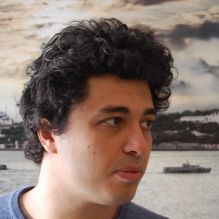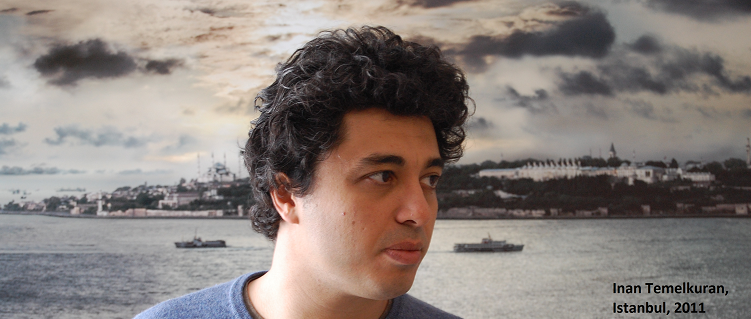
Inan Temelkuran Turkish filmmaker Inan Temelkuran was born in Izmir in 1976. He studied film making in Spain after he received his degree in law in Ankara. He is the director, writer and producer of the award-winning films Made in Europe and Bornova Bornova, both of which are part of Filmpot catalog.
Filmpot’s İlker Cengiz recently sat down with him in Istanbul and talked about many things over the course of an hour. This is Part 4 (final part) of our interview. Here are Part 1 and Part 2 and Part3.

FP: Which films shook you up?
IT: So many! Bogdanovich’s The Last Picture Show. Eric Zonca’s The Little Thief and The Dreamlife of Angels. Michael Winterbottom films such as In This World, which was about two Afghani boys’ trip from Afghanistan to England. Micheal Haneke’s Code Unknown. Mathieu Kassovitz’ Hate.
FP: Are you influenced by Turkish cinema?
IT: I do not much have influence. I like some people and their work. They do a good job. Possibly the one most affected me is Kader (Fate) of Zeki Demirkubuz. It is his best movie. It is the kind of movie that made me think like ‘this is something I would like to do’. Also, Three Monkeys of Nuri Bilge Ceylan. It is his best movie. He is collaborating with his wife and Dr Ercan Kesal, a famous doctor, who gives him many stories.
FP: With both feature films you received awards. How does that feel?
IT: Awards mean money to some extent. They make you feel like the family father, who puts bread on the table. Of course the awards encourage you to make new films. The main reason somebody becomes a filmmaker, I think, because he loves movies and he is a movie watcher. I watch every kind of movie and take something from all. Cinema has its things. When Brubaker gets out of jail everybody claps and you feel something. That kind of things make cinema great. You never get of the theater like that. You may get out super impressed, but cinema is different. You may hate that aspect also, if movie makes you feel empty. A film may give you relaxation, separate you from real life. My two movies are the kind of ones which will bother you.
FP: Can you tell us about your next project?
IT: It is a big time feel-good movie. First Turkish rock band movie about a band which has to go a tour in Turkey. They lose their sponsors, because they say something stupid. But they still go ahead with the journey and they run into a big adventure. It will be a fun movie.
FP: What are your thoughts on piracy?
IT: What can I say? Once they produced CD copiers, piracy started. And with Internet, who doesn’t download or watch music videos on YouTube? Sometimes you think about a song from your childhood. The kind of music you can’t find at the store, and you find it on YouTube.
FP: Impact of internet on film industry?
IT: Technology brings opportunities for creators and consumers. Will the artist be able to make a living out of art? I doubt it. They have to do something else. They have to make a living on something else, and make art at the same time. Such as the artist Futura, who works for Sony and Apple, but also does graffiti on the walls.
FP: Do you consider yourself as an independent filmmaker?
IT: Yes, but independence is per movie. It is something to be talked about per movie. Of course it can be for whole life. For me independence is possible in two ways. One, you don’t have money so you produce it yourself. Two, you have the freedom to choose your language for the movie. If it is not common language, that makes you independent. People in Chicago Movement were independent because of language. John Cassavetes’ film Shadows, 1930ies from French directors were like that. Lusi Bunuel’s Andalucían Dog is a great example of being independent. He made it with money from his mom; the film was shown in a cafeteria. And it became a milestone in history of cinema.
FP: And took place in history…
IT: There are people like Fritz Lang, Charlie Chaplin. They produced real piece of art. Also some people are in history because they were at the right place at the right time.
FP: How about you and history?
IT: It is not in my hands. But with festivals I’m now part of history. There has been no immigrant movie like Made in Europe. Only there was this one about Polish workers which was kind of similar.
Bornova Bornova can be an example of zeitgeist of these times in future. It is already cited in sociological research. I made a good job with both.
FP: Thank you for your time.
IT: Thank you for fighting piracy.
THE END


